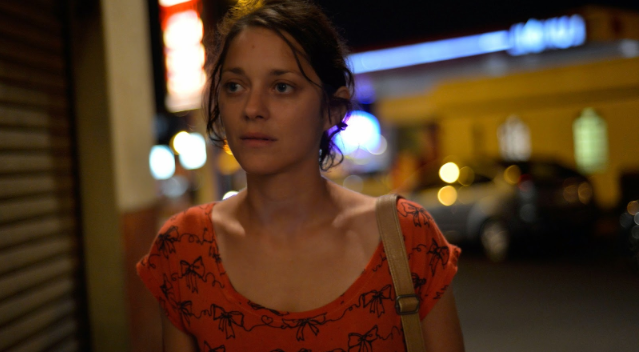Two Days, One Night
Selasa, 13 Januari 2015
Tambah Komentar
Minimalistic and realistic, the films of Jean-Pierre and Luc Dardenne are noted for what they are not. The Belgium film-making duo employ only the simplest cinematic tools; absent are the slow-motion shots, the montages, the music, extravagant set designs and ensemble casts. Their films are beautifully stripped-down, the features feel as though they are created of a single camera man and actor engaging in intimate shoots. A true film of the Dardenne brothers is recognised for its unrelenting patience and their latest feature Two Days, One Night, starring the effervescent Marion Cottilard, is no exception. True to form, the flick is based purely on real life challenges ranging from financial difficulties to mental illness, insecurity and self-doubt to the constant challenge of maintaining human connection. I cannot note Two Days, One Night for its cinematography nor its score - the film is shot most simplistically with handheld cameras and as for its score - well its non-existent. Even Cottilard appears bare-faced for the cameras, her raw performance all that is needed to win over this audience. What this feature essentially reveals is the sad but hopeful truth that individuals survive by everyday triumphs and the enduring contentment which it accompanies.
Two Days, One Night chronicles three days in the life of a young Belgian mother, Sandra (Marion Cottilard) who works as a labourer in a solar-panel factory. After taking a prolonged leave of absence after suffering a nervous breakdown, Sandra's colleagues are given the option to each receive a ¢1,000 bonus if they agree to make Sandra redundant. In the following few days, Sandra is persuaded by her husband to take a trip to individually visit each of her colleagues in hopes of convincing them to forgo the bonus so that she may remain employed. The significant issue at hand is that Sandra progressively begins to doubt not only her chances but her entitlement to the position.
From its opening credits, the Dardenne brothers establish the film to be more refined and more insightful than any mere concept piece. Presented as a life portrait of believable characters, Two Days, One Night is deeply personal and humane, utterly convincing the audience that we have stepped into their respective lives. It has achieved the phenomenal creative dream: the audience believes that after the film finishes these people go on living and they existed before it even started.
Similarly to earlier Dardenne flicks, The Child, Rosetta and The Kid with the Bike, the fighting ground of conflict is everyday life - the trials and tribulations faced by ordinary people. It is its relevance and empathetic approach which draws in the audience's attention - the viewers aware they are mere steps away from meeting similar fates. Each of Sandra's encounters with her colleagues and their respective families is an omnipotent reveal of dire and desperate human needs. The visits vary drastically in character; from the moving support of a guilt-ridden man, to the melancholic explanation of a woman's simple lack of choice to the frightening, violent response of an indignant, hard-working colleague.
The most unusual attraction to this latest Dardenne feature is the presence of a recognisable lead. Previously, the brothers had elected to cast little-known talent. Two Days, One Night signifies their first film to feature an internationally renowned actress. Marion Cottilard has, in this past decade, easily established herself as the face of prepossessing French cinema. Cottilard began in the early 2000s, appearing only in small independent films, exclusively shown in French-speaking countries. However she rose to immediate prominence following her spectacular performance as French cabaret singer, Edith Piaf, of the flawed by spirited La Vie en Rose. In the years that followed, audiences came to adore her scene-stealing escapades in Woody Allen's Midnight in Paris and Christopher Nolan's Inception. Her lead role in Rust and Bone as an amputee beguiled its audience once more. She immerses herself as Sandra Bya of Two Days with incredible ease, gracefully capturing the complexes of this suffering woman. Cottilard creates a character we imagine is hardened by life, tired, weary and almost timid - her body language wrapped in self-doubt. We see it in her despairing gaze, habitual hair-touching, reluctant stride and when it comes to it, her crestfallen tears of defeat and self-hate.
Tales of "triumph over diversity" typically fit the crowd-pleasing, feel-good bill. Two Days, One Night subverts this formula by rewarding its audience with a sobering and unexpected yet equalling fulfilling story arc. It is these such transcendent masterpieces of the Dardenne brothers that truly perpetuate Oscar Wilde's infamous proclamation that "life imitates art more than art imitates life". It is the viable, the realisable achievements of life, as represented by the Belgian directors, which truly inspire. You can dream big or dream real.



Belum ada Komentar untuk "Two Days, One Night"
Posting Komentar